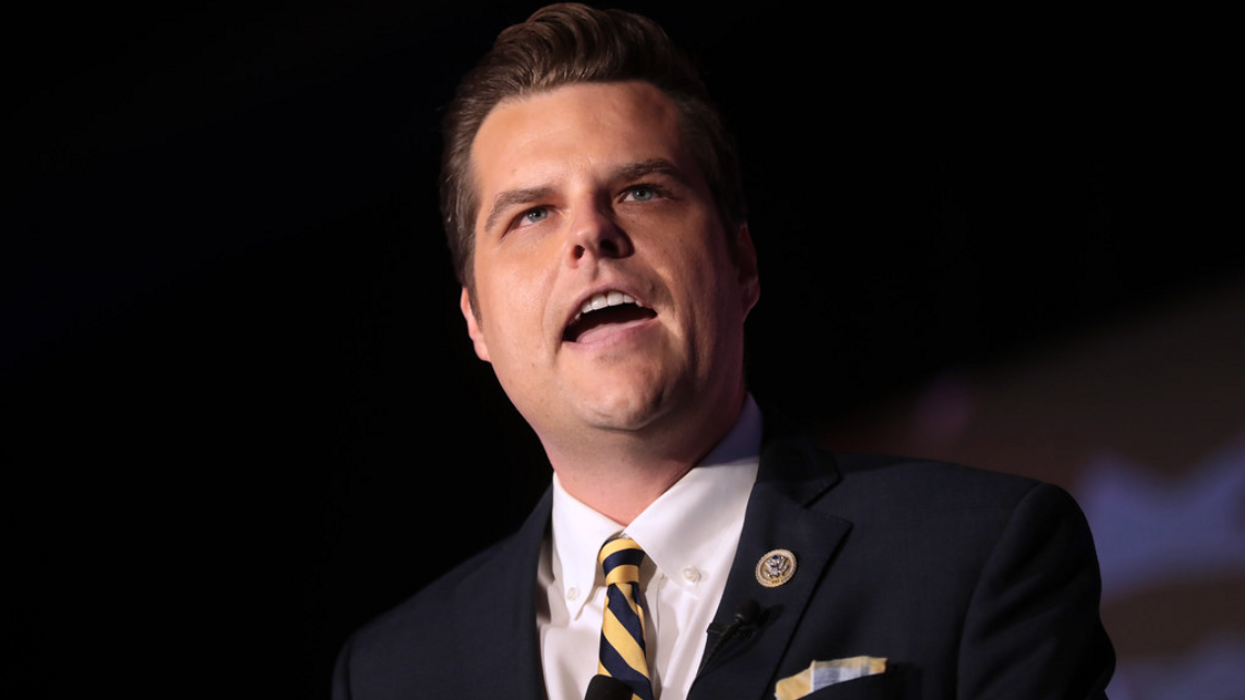The 'Catastrophic' Legacy Of Matt Gaetz
What a Christmas present! In its report released last Monday, the bipartisan House Ethics Committee cited "substantial evidence" that from 2017 to 2020, former Rep. and would-be Attorney General Matt Gaetz "regularly paid women for engaging in sexual activity with him," including an underage 17-year-old, and from 2017 to 2019, had in his possession illegal drugs including cocaine and ecstasy, on "multiple different occasions." Investigating a 2018 trip Gaetz made to the Bahamas, the committee found that he violated House rules by accepting transportation and lodging, which is not allowed. Summing up its conclusions, the committee found that Gaetz "violated House Rules, state and federal laws, and other standards of conduct prohibiting prostitution, statutory rape, illicit drug use, acceptance of impermissible gifts, the provision of special favors and privileges, and obstruction of Congress."
The House panel reported that Gaetz was "uncooperative" throughout its investigation and "knowingly and willfully sought to impede and obstruct the Committee's investigation of his conduct." They also found that he used his former chief of staff to "assist a woman with whom he engaged in sexual activity in obtaining a passport, falsely indicating to the U.S. Department of State that she was a constituent."
And he almost got away with all of it.
How? Why?
Those questions deserve answers.
This is the man who brought down Speaker Kevin McCarthy, twisting the House into knots and bringing about a dangerous stalemate in Congress.
This is the man who was Donald Trump's first choice to be attorney general of the United States.
The report was the product of a multiyear investigation of Gaetz that took place while he was taking a leading — and sometimes decisive — role in House deliberations and actively campaigning for the president-elect. Had Gaetz had his way, and some of his Republican colleagues had theirs, we would still not know the truth about him. Gaetz brought suit to attempt to block the committee's release of the report, in a complaint that reportedly requested a restraining order and injunction, claiming that the committee's action violated the Constitution in its effort to "exercise jurisdiction over a private citizen through the threatened release of an investigative report containing potentially defamatory allegations."
Gaetz resigned from Congress two days before the report was due to be issued, in an obvious attempt to block the report's release. It was the same day he was nominated for attorney general. Rep. Michael Guest, who chairs the Ethics Committee, opposed its actual release. While writing that he and other Republican members "do not challenge the Committee's findings," he argued that releasing a report about someone who is no longer a member of Congress, "an action the Committee has not taken since 2006," is "a dangerous departure with potentially catastrophic consequences."
The "catastrophic consequences" are that this criminal served in a leading capacity in the House of Representatives and almost became the attorney general of the United States. The "catastrophic consequences" are that he was nominated for that position by a president-elect who was — we have to presume — utterly ignorant of the fact that this man's peers had concluded that he was a serial felon who got away with it.
Why is a member of Congress free to not cooperate with a committee charged with ensuring that members of Congress act ethically? Why did they wait years while he actively obstructed their investigation before making that clear? Just a few weeks ago, he was talking about running for Marco Rubio's Senate seat in Florida. Didn't the citizens of Florida have a right to know what the House committee had concluded? How could the chair of the House Ethics Committee say no to that? Talk about dangerous precedents.
The Matt Gaetz debacle is proof positive that Americans have every reason to distrust Congress, which is a sad state of affairs in a democracy. Gaetz's legacy, if you can call it that, is that a president should not nominate anyone to high office without careful vetting, and that the public has a right to know about the integrity of the men and women we elect to serve us. The Ethics Committees of Congress should do more, do it publicly and be transparent about their work. Non-cooperation, active efforts to obstruct justice, should not be tolerated, and should be disclosed. Matt Gaetz had no business even being considered for attorney general when his only qualification was his loyalty to Donald Trump. The members of the committee knew that. Why didn't anyone tell Donald Trump? Or us? This is a story that should not go away.
Reprinted with permission from Creators.

